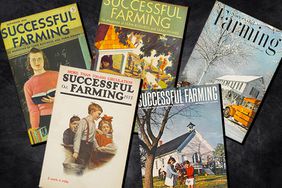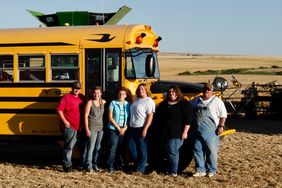:max_bytes(150000):strip_icc()/HometownHeroesopenerillo-5ddf4889165b42ce93ff5548bb469d92.jpg)
Paul Lange
Small business owners, like farmers, wear many hats. They handle accounting, marketing, maintenance, and cleaning. No two days are the same and flexibility is key. There is a responsibility not only to themselves, but to others who depend on them.
Especially in rural towns, small business owners sometimes ARE farmers. The lessons learned on the farm translate into products and services that are in demand by people both down the street and across the country.
For this installment of Hometown Heroes, the word ‘hero’ can mean many things. It’s a willingness to sacrifice for others, an attitude of service, and an unselfish desire to make things better.
And while none of these business owners would call themselves a hero, in their own ways they are, because they are improving their neighbors’ well-being and breathing new life into their communities.
Berries and Bees and Goats, Oh My!
Tim and Danielle Clarke didn't start out wanting to manage a strawberry farm, keep bees, or raise goats. But since 2017, they’ve made Mayberry Farms in Mayville, Wisconsin, a successful business incorporating all those components and more.
“We wanted to find a farm, but everything was out of our price range as beginning farmers,” Danielle says. “We thought about working with our families, all of whom farm, but that wasn’t the right fit for us. Then one day, Tim came home and said, ‘I found us a farm,’ and our farm dream started to take root.”
Located in the middle of Dodge County, about halfway between Madison and Milwaukee, the property had a few acres of strawberries. “I had never been to a strawberry farm,” Danielle says. “My first experience with picking strawberries was when we opened for business our first season.”
Investments into more plants, modern equipment, and facility upgrades quickly provided opportunities. After attending a fruit and vegetable growers conference, Tim came home with the mission to establish honeybee hives to promote pollination and add new products to the farm’s offerings.
“And then during the pandemic, with the uncertainty of on-farm public activities, Tim finally gave in to my interest in milking goats,” Danielle says with a laugh. “We quickly learned how much we had underestimated the overage in milk production.”
:max_bytes(150000):strip_icc()/Mayberry4_preview-7388a583cf78431d85f554d0fa7a1230.jpg)
After a Pinterest search of “what to do with excess goat milk,” she hit on making soap with the honey and beeswax from their hives. After taking an e-course, soap quickly turned into lip balm, lotion bars, and candles, which led to their first on-farm pop-up shop in the winter of 2020.
“The support from the community was overwhelming and it’s become a passion for me to find products that my customers enjoy and also that can help with dry skin, allergies, things they may be dealing with,” Danielle says.
Connecting with their community and educating about agriculture is a passion of the Clarks, and they host several events on the farm to attract visitors. “We love sharing the story about how food is produced, and having the direct-to-consumer piece is really important to us, too,” Danielle says. “This just checks all the boxes.”
From Chore Boots to Bowling Shoes
Jon and Crystal Blin added the title of bowling alley proprietor to their resume when the purchased 319 Social House, a 10-lane bowling alley in Independence, Iowa.
The town of about 6,000 people, located between Dubuque and Waterloo in northeast Iowa, had supported the bowling alley since 1952. Jon joined a league with friends when he moved back to Independence after college.
“It was something for the guys to do once a week,” Crystal says. “He always kind of joked about owning the bowling alley; at least I thought it was a joke. Then three years ago, he was diagnosed with cancer.”
Beating cancer made the couple realize that if they wanted to do something, they should go for it. The previous proprietor was facing his own health issues and was ready to sell.
The Blins purchased the property on New Year’s Day 2022 and went to work creating a community gathering space. They employ 10 people and host fundraising events for many local causes and charities.
“Last year, we helped the community raise over $20,000,” Crystal says. “It’s very important to us to have an impact on people, especially young people.”
:max_bytes(150000):strip_icc()/BowlingAlley2_preview-dd48ba22272e4337a8358ad6ca256108.jpg)
Crystal grew up in Canada on a cattle farm and came to the U.S. on a livestock judging scholarship at Kansas State University. Jon got his first taste of agriculture when he joined 4-H at age 14 after his family bought some Hereford cattle. After their marriage, the Blins kept up the cattle herd and had a small freezer beef business until October 2022, when they realized the bowling alley was the place they could have the biggest impact.
“We leased out our farmland to a fellow young farmer, and it allowed him to expand,” Crystal says. “It feels like a win-win decision.”
She credits their agricultural background with developing their work ethic, grit, and ability to repair the equipment, all of which have helped make the bowling alley a success.
“When you’re farming, you’re at the mercy of Mother Nature. You can do everything right but then walk out one day and find a heifer dead or you don’t get the right amount of rain,” she says. “We jokingly say on our worst day at the bowling alley, at least nothing dies. Our employees are sometimes surprised at how quickly we can bounce back from a hard day.”
More Than Just Groceries
When Mount Pulaski, Illinois, lost its grocery store in the late 2010s, it was a blow to the community of 1,500 people located 30 miles northeast of Springfield, the state's capital.
“We have a school system, several churches, businesses, and a lot of families,” says Kaitlin Weitekamp, who works remotely for John Deere and lives on her husband’s family’s corn and soybean farm. “There was a huge gap there to fill.”
A group of local business owners, farmers, and community members came together with the idea of forming a cooperative grocery store, not only to replace the store they had lost, but also to provide an avenue for local products and specialty items not available in other places.
“There was a lot to learn about opening a co-op. We had people involved that had financial backgrounds, marketing backgrounds, and other talents to bring this to fruition,” says Weitekamp, who now serves as Market on the Hill board president. They also worked with Sean Park at the Illinois Cooperative Development Center, based at Western Illinois University in Macomb, for guidance and connections with other similar small-town cooperatives.
Market on the Hill opened its doors in June 2020 and has evolved with the needs of its community.
“We listen to what customers are requesting and also look at seasonal needs beyond the staples of milk and bread,” says Amanda Scattergood, general manager. “We’re trying to streamline but also incorporate local items wherever we can, things you can’t just go to Walmart and find.”
Some of those specialty items include pork from Tri Pork and Huelskoetter Pork; milk from Little Brown Cow; honey from Sasse’s Apiary; produce from Bradshaw Farms and PrairiErth; eggs from Bland Family Farm; and sauces, jams, and jellies from Kathy’s Kitchen.
:max_bytes(150000):strip_icc()/Market5_preview-8f2f87d1153b4625a62e81d3fc36b97e.jpg)
Board member Thomas Titus is part of Tri Pork and provides the market with some of its fresh meat products.
“We hadn’t planned to enter the retail space, but the pandemic forced us to be creative,” he says. “Market on the Hill was just getting started at that same time, and we feel very fortunate to be able to supply our community with great pork products, raised within minutes of the market.”
As a cooperative, the business is structured in a way that means individuals have a personal stake in the store’s success. Preferred shares were sold in an initial run, with additional shares available for purchase now. While anyone can shop at the store, shareholders receive a dividend when the store is profitable.
“We’ve had people come in and buy shares for their children for gifts, and that’s a great way to support the market and get involved,” Weitekamp says.
The store employs seven paid staff members and also relies on volunteer help during busy times. When the local Subway sandwich shop closed, the store’s deli became even more popular, with specialty sandwiches and other items available daily for lunch. The co-op’s resident baker makes cinnamon rolls, cookies, and other sweets, which are very popular.
“We recently received a grant for an espresso machine, and that has been a wonderful addition,” Scattergood says.
The store also is available for small meetings or as a workspace, and it has hosted kids crafting days at Christmas. She says they are looking at other collaborations with local artists for special events.
“This place is not just a grocery store or a deli,” Scattergood says. “We’re really a hub for the town.”
Seed to Spirit
Fifth-generation farmer Jamie Walter was looking to diversify his northern Illinois Farm. He considered baked goods. He considered popcorn. He considered wine.
“And then one night I was sitting at my desk, sipping on a bourbon, and a lightbulb went off,” he says. “Bourbon has to contain at least 51% corn, and DeKalb, Illinois, is the Napa Valley of corn.”
After carefully assessing the farm’s strengths and weaknesses, Walter knew growing the grain wasn’t going to be the problem.
“You can make wine or beer in your home for personal consumption, but if you distill a single drop of beverage alcohol, it’s a felony,” he says. “There was no way to practice legally, and that’s where we knew we needed to bring in someone to teach us about distilling and to help us get our federal and state permits.”
Dave Pickerell, former master distiller for Maker’s Mark, was that someone. Walter hired him in 2012 and rounded out his business plan with his father, Jim Walter, an award-winning Master Farmer; and Nick Nagele, a family friend with a strong public relations and marketing background.
“We got all the equipment together in 2013, and by 2014, we were off and running,” Jamie says about the start of Whiskey Acres (whiskeyacres.com).
Today, their farm grows all the corn, rye, and barley used in their products.
“Our primary corn is three different varietals of yellow dent corn that we’ve identified that grow well here but also have fantastic grain quality,” Nagele says. “But our way of really standing out in the marketplace is to invest heavily in our artisan series line.”
:max_bytes(150000):strip_icc()/170717_WhiskeyAcres_Portraits_045_preview-896eb1e8b155443c90919161017bda71.jpg)
That series is made from Oaxacan green corn, blue popcorn, or heirloom Bloody Butcher corn. Only Whiskey Acres produces these specialty spirits, and Nagele compares them to different flavor profiles found in wine.
“It’s easy to understand that a red grape makes a different flavor than a white grape,” he says. “Green corn makes a different flavor than yellow corn. We’re trying to mirror an estate vineyard concept here, just with corn.”
To that end, Walter crossed an heirloom yellow corn from Minnesota with an open-pollinated red flint corn from Italy, creating a brand-new hybrid unique to the distillery, which employs more than 30 people.
In 2019, Whiskey Acres opened an event space, which hosts weekend events with live music and food trucks, along with meeting rooms for the community to use. Visitors have come from more than 40 states and 50 countries, including a group of researchers from Antarctica.
“We’re darn proud of what we’ve built, and the image we project on behalf of modern American agriculture,” Nagele says.
Small Town, Small Business
Thriving businesses are key indicators of small town survival. Farm families benefit from living near healthy small towns, and the skills and mindsets needed to man-age a farm often translate well into running other types of businesses.
One way a group of people can unite to achieve a common goal is to form a cooperative.
“I see several benefits of co-ops,” says Sean Park, Illinois Cooperative Development Center (ICDC) program manager. “For one thing, co-ops tend to employ more people, so there’s more of a boost in revenue to the community. Individuals have more of a say, so they have a differ-ent sense of identity.”
Forming a co-op helps share the financial risk of starting a business.
“Financially, it doesn’t always make sense to go into smaller communities with certain businesses,” Park says. “But with a co-op model, the folks in town have some buy-in.”
Individuals looking to start traditional businesses also can take advantage of a number of resources. Loans from community banks can provide favorable interest rates. Depending on the business, other lenders, such as the Farm Credit System, are options.
“If an individual is actively engaged in farming, sometimes the Farm Credit System can provide financing, depending on the type of business,” says Glen Semple, senior commercial lender, Farm Credit Illinois, based in Mahomet. “I recommend contacting your local Farm Credit to determine if your business model is eligible.”
The Rural Economic Development Loan and Grant programs through USDA are good options for agriculture-related businesses that increase employment opportunities in rural communities. The Small Business Administration cooperates with community banks to guarantee the loan principal, taking on some of the risk involved in starting a new business. Some chambers of commerce also offer community improvement grants.
:max_bytes(150000):strip_icc()/37948089_10156114335694213_6656180082995888128_o-0814a929e3b4446dad2b85d9c8bfc789.jpg)






